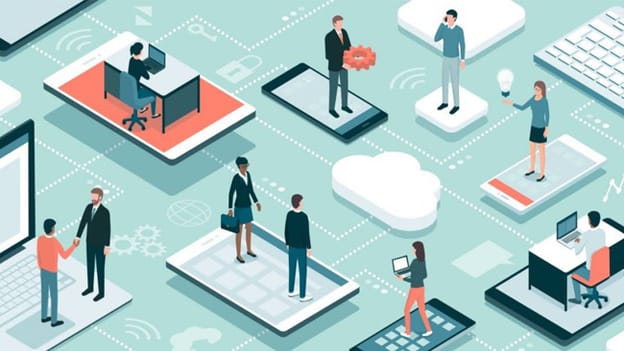Reimagining workspaces: The digital culture reset

Over the last few years, businesses across the globe have been reimagining their workplace with automation of jobs, adoption of AI, introducing analytics into business processes and exploring the option of remote working. But COVID-19 has accelerated the adoption of remote work and enablement of a digital workplace. According to a McKinsey survey, after the pandemic there will be 36 percent increase in work time outside offices. Leaders now must accept the importance and need of the digital workplace and start to consider the same for the future. What started with meeting the immediate need, now has become the new culture.
As we look towards the future of work, many employees who were once full-time office workers have now become full-time remote workers while others are looking forward to a hybrid model with a part-time office and home presence or work from anywhere models. With this change, organizations need to update and tweak their HR policies, workplace settings, and most importantly, enhance their digital workplace. This shift in work norms creates an opportunity to scale to the next level of productivity, operations, and business performance to achieve their goals in line with their organizational values and purpose.
It is very important for leaders and organizations to understand the concept of a digital workplace. This digital workplace is an extended arm to a physical office location and is possible only with technology aiming to improve collaboration, employee engagement, resource management, business processes, employee & customer wellbeing and experience. The concept of digital workplace gives us a picture about the shift in the way people like to work and more importantly, where they like to work.
Recently, new expectations about working conditions and maintaining a work-life balance, which involves a lot of flexibility, have come up among many employees across the industry. Organizations that will be able to find the right balance, in future, will be successful in driving productivity, engagement and empower employees across departments, teams, and locations, leading the edge as we enter this new world of work.
This digital culture, will also need organizations to combat the digital workplace deficits by creating and nurturing the positive aspects of their deployed digital tools, ensuring that race for efficiency and effectiveness does not negatively impact the experience of employees. Being data driven, will be key in the evolution of the virtual organization culture and optimizing the employee experience.
Digital workplace culture will involve fewer commutes, more flexibility
With a growing remote workforce, active communication to build a sense of belongingness and inclusion is a must to nurture a growth environment and a psychologically safe workplace culture with agility, innovation and empathy at its core. Platforms like intranet or an internal communication platform/ chatbot can be utilised to bridge the gap and avoid any mis-information to spread and keep a check on cyber security. While operating into the work from home culture, organizations also need to ensure that the workforce is well equipped to cater to customer needs and access critical data safely and securely. The digital workplace culture will involve fewer commutes, more flexibility, and new ways to manage strong collaboration and innovation with an aim to deliver customized employee experiences to enhance productivity and performance.
Further, hiring and onboarding have transformed as well as they involve application tracking systems and video conferencing. The next step towards adding value to the Talent Acquisition journey is through Talent assessments & AI tools to find the right fit for the organizations. To ensure a strong Digital infrastructure, Tech talent is also a must for all organizations, across the market.
In hybrid workplaces, managers and leaders will have to put in more effort towards fostering relationships and building trust online through honest, forward looking and sincere conversations, even if it is not in person. Leaders and organizations must focus on diversity and inclusion to drive better outcomes with engaged, innovative employees and greater opportunities for growth.
To thrive in this new culture, Digital upskilling is also must across departments to interact and collaborate effectively with peers and customers via multiple channels while simultaneously focussing on daily operations and working remotely. To ensure that people have the necessary digital skills to effectively perform current and future jobs, organizations must create an environment and culture that fosters continuous learning and training. Organizations will increasingly require flexible, technology-driven learning environments to support the expanding range of jobs and work procedures. These could vary from e learning, VILT to micro learning and live classroom sessions. Blended journeys with a focus on behavioural and technical skills will add to the confidence of the workforce.
Since the last few months, the velocity of change is putting a strain on everything, from IT infrastructure to leader-employee relations. Organizations need to rethink and redefine the way their people can continue to succeed. With the growing digital technologies and processes, modern, accessible IT infrastructure, and cloud based software that are essential to cope up with the challenges of remote working, digital strategy should reflect in the way leadership teams work and lead by example.
Business leaders must themselves see and show to their people a clearer picture of how resilient their business models are and where enhancements are needed to operate successfully. Enabled by an accessible and strong digital culture, organizations can use this knowledge and skills to redefine their workforce, reinvent work, and put their companies on course for future success.
Digital leaders need to consider solutions backed by an agile and robust network to ensure the interaction is secure, scalable, and delivers a higher customer experience. Leading by example, role modelling values and behaviours, supporting the transformation by giving it consistent and constant attention, championing the change by leading and motivating others and being available to make effective and influential decisions regarding digital transformation are a few ways by which leaders can steer this digital transformation journey.















